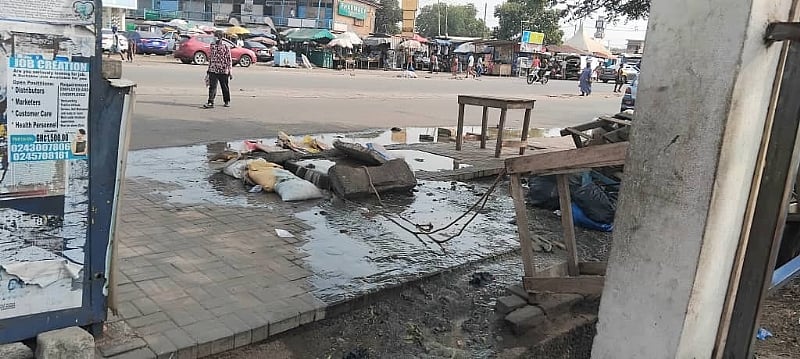The sanitation crisis in Tema Community One, Ghana, has reached a critical point, with residents expressing grave concerns over the persistent spillage of liquid waste, particularly in the market area. This alarming situation, which has worsened in recent months, poses a significant threat to public health, raising fears of a potential cholera outbreak. Overflowing gutters filled with human waste have become a common sight, creating an unbearable stench and exposing residents to dangerous pathogens. Despite numerous complaints to authorities, the problem remains unresolved, leaving residents frustrated and demanding a permanent solution. They argue that temporary fixes are insufficient and advocate for a complete overhaul of the aging sewer system, emphasizing the importance of proactive measures rather than reactive responses to outbreaks.
The impact of the overflowing sewage extends beyond the unpleasant odor and health risks. Local businesses, especially those in the market, are suffering significant losses. Vendors report a sharp decline in customers due to the unsanitary conditions, forcing some to close their shops entirely. Others attempt to mitigate the impact by wearing nose masks and using antiseptic solutions, but these measures provide limited relief. The pervasive nature of the spillage affects daily life for residents, particularly children who are often seen playing near the contaminated areas, increasing their risk of exposure. Residents express a sense of urgency, emphasizing the need for immediate action to prevent the situation from escalating into a full-blown health disaster.
The call for a systemic overhaul of the sewer system highlights the long-standing neglect of this critical infrastructure. Residents point to the lack of upgrades since the era of Dr. Kwame Nkrumah, Ghana’s first president, as evidence of this neglect. They argue that the current system is inadequate for the growing population of Tema and that temporary repairs will not suffice. This sentiment reflects a broader concern about the prioritization of sanitation infrastructure and the need for long-term planning to address the needs of a growing urban population. The residents’ frustration underscores the importance of proactive investment in infrastructure to prevent such crises from occurring in the future.
The Tema Metropolitan Assembly (TMA) acknowledges the severity of the problem and claims to be actively working on repairs and unclogging blocked drainage systems. However, they also place some responsibility on residents, urging them to avoid dumping solid waste into gutters and sewers, which contributes to blockages. While this appeal for responsible waste disposal is valid, residents argue that it does not address the root cause of the problem, which is the outdated and inadequate sewer system. The ongoing spillage despite the TMA’s efforts suggests that a more comprehensive and long-term solution is required.
Observations from the Ghana News Agency (GNA) paint a grim picture of the situation on the ground. Despite the TMA’s efforts, sewer lines and chambers continue to overflow for days, releasing raw sewage into the Community One Business Area. The market, a vital hub of economic activity, is particularly hard hit, with vendors struggling to cope with the unsanitary conditions. The flowing sewage forces many to shut down their businesses, while those who remain open resort to desperate measures to protect themselves and their customers from the stench and potential health risks. The GNA’s report provides a stark visual of the crisis, emphasizing the urgency of the situation and the need for immediate and effective intervention.
The sanitation crisis in Tema Community One is a complex problem with far-reaching consequences. It not only poses a serious threat to public health but also disrupts local businesses and impacts the quality of life for residents. While the TMA’s efforts to address the immediate issue are acknowledged, the underlying problem of an outdated and inadequate sewer system requires a long-term solution. The residents’ calls for a complete overhaul of the system reflect a growing awareness of the importance of investing in sanitation infrastructure and adopting a proactive approach to prevent future crises. The situation in Tema Community One serves as a stark reminder of the consequences of neglecting essential public services and the urgent need for sustainable solutions to ensure the health and well-being of communities.














